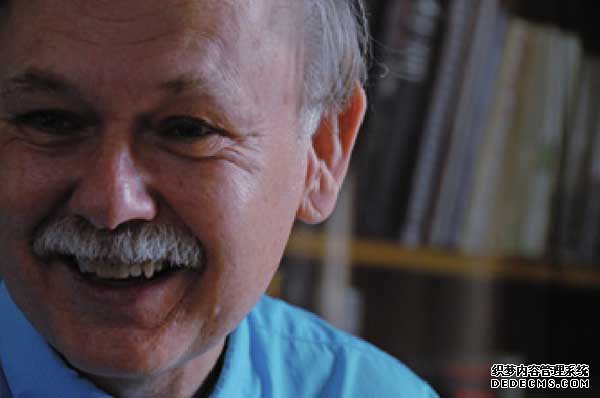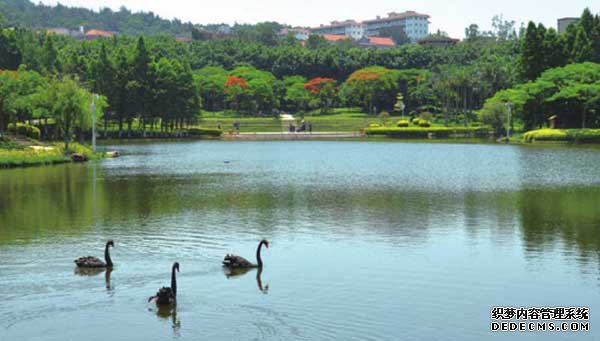Relax, the man grins. It’s not a real snake, just a fake one.
“It was a psychological test I made during class,” smiled Professor William Brown, who has been teaching business in Xiamen University’s MBA Center since September 1988. “It was all about perception. Was it logical to be afraid of a snake? My students said yes because they didn’t know the snake was fake. People don’t have time to think, but react immediately. That’s the point.”
Besides tricks for case studies, the 60-year-old, who is a former member of Magic Castle, the magic academy in Hollywood, also juggles and plays poker and the guitar to make his classes more fun.
“There’s no way to limit students’ use of mobile phones in the classroom. So I just see it positively: be creative and do more communication,” he said.
A new start
After graduating from high school, helping poor farmers in South America was top of Brown’s wish list, but a beautiful poster of an African island changed his mind.
“If you join us, you could see a lot of places like this,” a U.S. Air Force recruitment officer told him. More importantly, the four-year military service would pay for his college.
The young airman was sent to Taiwan in 1976. He was 20 at that time. Brown started to learn Chinese history and culture and stayed there till 1978. A decade later, after much more wandering, he brought his wife Susan Marie, an American born and raised in Taiwan, and two young sons to settle down in Xiamen on the opposite side of the Taiwan Straits.
“I thought joining the military was a mistake but that turned out to be good,” Brown said.
Before settling down in Xiamen, the travel bug-bitten Brown had lived in 30 places. The longest stay was in California where he spent seven years studying.
Why choose Xiamen instead of Beijing or Shanghai? It was because Xiamen University was the only varsity on the Chinese mainland accepting foreign staff with family in the late 1980s.
“Xiamen is open to non-locals. That was written by foreigners some 200 years ago. It really is,” Brown emphasized.
At first, he planned to stay for just a year or two. But he was told the university would open an MBA program designed to be the best in China and the world. “I said well, yes, I would help, and now it’s been 28 years. Unbelievable!” he exclaimed. Founded in 1921 by Tan Kah-kee (1874-1961), who went abroad to make his fortune and became widely known as the Henry Ford of Asia, Xiamen University is regarded as a national pioneer in MBA education. It set up the first MBA center in 1986, awarded the first MBA degree four years later, was the first to publish MBA teaching materials, wrote the first MBA national teaching guidelines and promoted the first MBA national entrance exams.
 One of the accomplishments, in Brown’s eyes, is their MBA program being listed among China’s top 10 educational programs by several renowned business publications, including Forbes. In 2014, the university became the latest partner in OneMBA, a global executive MBA program run on four continents: North and South America, Europe and Asia. Students of the program can share their thoughts with and pay visits to top business schools in China, the United States, the Netherlands, Mexico and Brazil.
One of the accomplishments, in Brown’s eyes, is their MBA program being listed among China’s top 10 educational programs by several renowned business publications, including Forbes. In 2014, the university became the latest partner in OneMBA, a global executive MBA program run on four continents: North and South America, Europe and Asia. Students of the program can share their thoughts with and pay visits to top business schools in China, the United States, the Netherlands, Mexico and Brazil. For Brown, working with four professors from counterpart schools and teaching students from 30-odd countries in one single course is by no means an easy job. The difference between Chinese and Western students is striking. Chinese students have an incredible foundation but less creativity while Western students have great creativity, but less foundation. Without a foundation, creativity remains a daydream.
“Mr. Tan, the university founder, believed in traditional Chinese values while using modern international education to know about the world. I think we made it although there is still a lot that could be done,” Brown said.
“We didn’t have any electricity in the classroom back in 1988. I would never have imagined that China, Xiamen and Xiamen University would change so quickly. I just happened to be here to see this change in a key period. That’s fate,” he continued.
The transformation
In the early 1990s, the top goal of most of Brown’s students was to leave China as they had little confidence, both in their own capabilities and in the environment in China.
 “I told them the real opportunities were in China. If you studied history you could see that,” Brown said.
“I told them the real opportunities were in China. If you studied history you could see that,” Brown said. In order to underline his decision to stay on, Brown applied for permanent residency in China. In 1993, he became the first foreigner in Fujian Province to get it.
“Now, fewer students are leaving and lots of leavers are coming back because they see more opportunities for work and starting up their own businesses,” Brown said.
The magic of Xiamen, in his view, is really the people. The local’s warmth and welcome impressed him when he first landed there at the age of 32. But they seemed low-spirited,“Maybe because Xiamen had gone through so many things as a treaty port since 1840,”he said.
Things began changing in the mid-1990s when the city started upgrading its infrastructure against the backdrop of the entire nation’s economic growth.
“Money can make a beautiful garden city, but the soul of a city lies in its people,”Brown said. In his eyes, their attitude has changed in a more positive and energetic way, and they have became prouder of their city. However, their openness to non-locals remains unchanged.
“I wish Xiamen will keep its international heritage to make it more accessible to foreigners,” Brown said.
Over the years, he has acquired a host of laurels, including the National Friendship Award, the highest honor for foreigners living in China, inclusion in the Top 10 People Moving Xiamen, a 2003 poll by the local people, and a place in the Top 10 Educators selected by the State Administration of Foreign Experts Affairs in 2014.
While Brown and his wife live in Xiamen, their elder son is in Beijing and the younger one in the United States.
“I can’t imagine living anywhere else but in Xiamen,” Brown said in farewell. “I will keep teaching and keep watching what happens. I plan to live here until they bury me here.”

